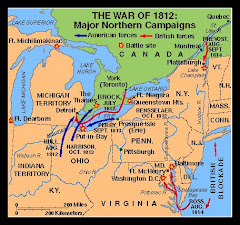War of 1812 Timeline
DATE
EVENT
EVENT
1803-1812
British impress approximately 10,000 Americans forcing them to work on British ships.
British impress approximately 10,000 Americans forcing them to work on British ships.
July 23, 1805
British decide in Essex case that American traders who travel between neutral and enemy ports will allow for the seizing many commercial ships.
British decide in Essex case that American traders who travel between neutral and enemy ports will allow for the seizing many commercial ships.
January 25, 1806
James Madison delivers report concerning British interference and impressment of sailors causing anti-British feelings to arise.
James Madison delivers report concerning British interference and impressment of sailors causing anti-British feelings to arise.
August, 1806
American minister James Monroe and envoy William Pinkney are unable to resolve the major problems between the British and Americans concerning commercial shipping and impressment.
1806
THe British blockade France; American ships are caught in the middle and the British seize approximately 1000 US ships.
American minister James Monroe and envoy William Pinkney are unable to resolve the major problems between the British and Americans concerning commercial shipping and impressment.
1806
THe British blockade France; American ships are caught in the middle and the British seize approximately 1000 US ships.
March 1807
Thomas Jefferson receives the Monroe-Pinkney treaty but does not submit it to Congress because it represents a dismal failure for the Americans.
Thomas Jefferson receives the Monroe-Pinkney treaty but does not submit it to Congress because it represents a dismal failure for the Americans.
June 1807
The American ship Chesapeake is fired on by the British ship Leopard after refusing to be boarded. This creates an international incident.
The American ship Chesapeake is fired on by the British ship Leopard after refusing to be boarded. This creates an international incident.
December 1807
Thomas Jefferson attempts "peaceful coercion" of the British with his embargo but it results in economic disaster for merchants.
Thomas Jefferson attempts "peaceful coercion" of the British with his embargo but it results in economic disaster for merchants.
1811
Battle of Tippecanoe - Tecumseh's brother (the Prophet) leads attack on William Henry Harrison's army of 1000 men.
Battle of Tippecanoe - Tecumseh's brother (the Prophet) leads attack on William Henry Harrison's army of 1000 men.
June 18, 1812
America declares war against the British. This war is known as "Mr. Madison's War" or "The Second American Revolution."
America declares war against the British. This war is known as "Mr. Madison's War" or "The Second American Revolution."
August 16, 1812
U.S. loses Ft. Mackinac as the British invade American territory.
U.S. loses Ft. Mackinac as the British invade American territory.
1812
Three attempts are made by the U.S. to invade Canada. They all end in failure.
Three attempts are made by the U.S. to invade Canada. They all end in failure.
1812
The USS Constitution ("Old Ironsides") defeats the HMS Guerriere.
The USS Constitution ("Old Ironsides") defeats the HMS Guerriere.
January 1813
Battle of Frenchtown. British and Indian allies repel Kentucky troops in bloody fighting. The American survivors are killed in the Raisin River Massacre.
Battle of Frenchtown. British and Indian allies repel Kentucky troops in bloody fighting. The American survivors are killed in the Raisin River Massacre.
April 1813
Battle of York (Toronto). US troops take control of Great Lakes and burn York.
Battle of York (Toronto). US troops take control of Great Lakes and burn York.
September 1813
Battle of Lake Erie. US forces under Captain Perry defeat a British naval attack.
Battle of Lake Erie. US forces under Captain Perry defeat a British naval attack.
October 1813
Battle of Thames (Ontario, Canada). Tecumseh is killed in a US victory.
Battle of Thames (Ontario, Canada). Tecumseh is killed in a US victory.
March 27, 1814
Battle of Horseshoe Bend (Mississippi Territory). Andrew Jackson defeats the Creek Indians.
Battle of Horseshoe Bend (Mississippi Territory). Andrew Jackson defeats the Creek Indians.
1814
The British plan a 3-part invasion of US: Chesapeake Bay, Lake Champlain, & the mouth of Mississippi River. The British are eventually turned back at Baltimore harbor.
The British plan a 3-part invasion of US: Chesapeake Bay, Lake Champlain, & the mouth of Mississippi River. The British are eventually turned back at Baltimore harbor.
August 24-25, 1814
The British burn Washington, D.C. and Madison flees the White House.
The British burn Washington, D.C. and Madison flees the White House.
September 1814
Battle of Plattsburgh (Lake Champlain). The US secures its northern border with a huge victory over a larger British force.
Battle of Plattsburgh (Lake Champlain). The US secures its northern border with a huge victory over a larger British force.
December 15,1814
The Hartford Convention occurs. A group of Federalists discuss secession and propose seven amendments to protect the influence of Northeastern states.
The Hartford Convention occurs. A group of Federalists discuss secession and propose seven amendments to protect the influence of Northeastern states.
December 24, 1814
Treaty of Ghent. The British and American diplomats agree to return to the status quo from before the war.
Treaty of Ghent. The British and American diplomats agree to return to the status quo from before the war.
January 1815
Battle of New Orleans. Andrew Jackson scores a huge victory and paves the way to the White House. 700 British are killed, 1400 are wounded. The US only loses 8 soldiers.
Battle of New Orleans. Andrew Jackson scores a huge victory and paves the way to the White House. 700 British are killed, 1400 are wounded. The US only loses 8 soldiers.




No comments:
Post a Comment